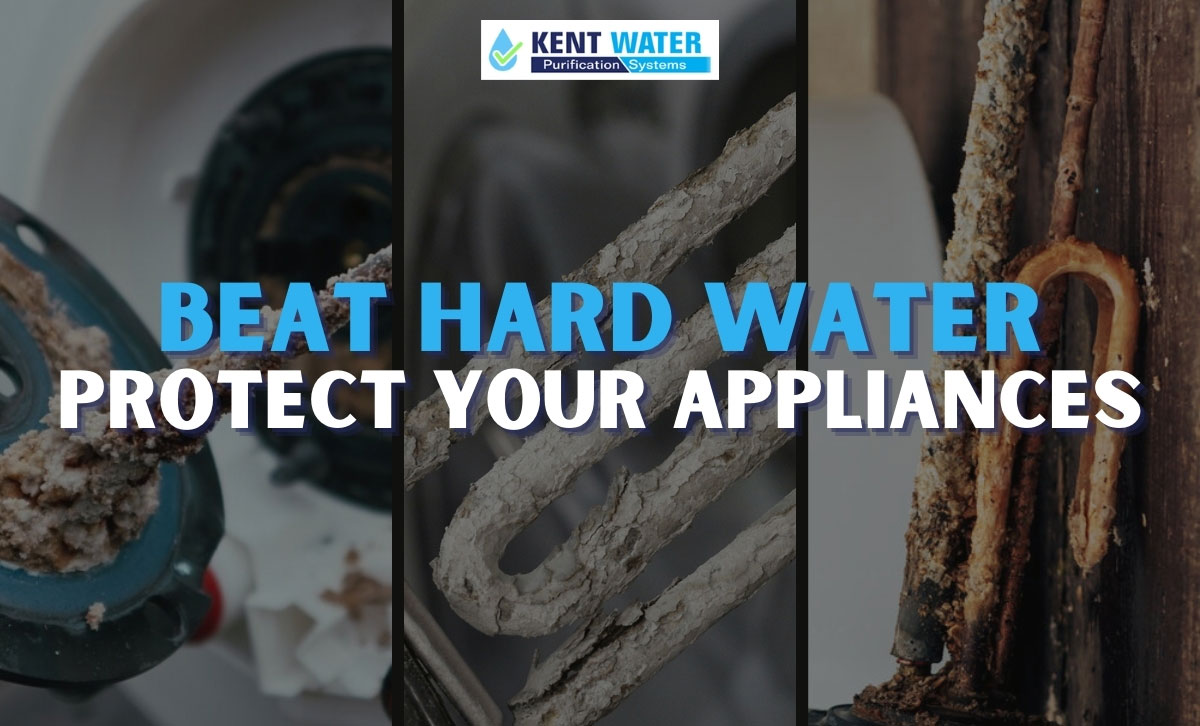As hard water is a recurrent matter regarding water quality, you are most likely aware of its characteristics and some of its visible effects in your household. In our previous article, we gave a quick overview of the hidden effects hard water can have in your everyday lives. Today, we will delve a little deeper into how it can significantly affect your appliances and the consequences it can lead to.
Hard water is mineral-rich and can cause scale build-up in pipes, particularly in those that supply hot water. This can greatly affect the performance of your household water appliances such as the water heater, dishwasher, and washing machine. As a result, these items are commonly the most impacted by hard water.
Water Heaters: the most vulnerable appliances to hard water
Water heaters, as one of the largest water-based appliances, are also highly vulnerable to the effects of hard water usage. As water evaporates into a gas when heated, the remaining minerals form a rock-like buildup at the bottom of the tank or near the heating element. This occurrence can substantially deteriorate the different parts of the unit, such as the hot water sensor or the heating element. Subsequently, your unit may not be able to heat water to the appropriate temperature, resulting in water that is either dangerously hot or not heated at all.
Furthermore, as the deposits build up over the heating element, the unit must heat through the scale layer before being able to heat your water. In doing so, your water heater works twice as hard to heat the same amount of water, using more energy and eventually leading to appliance failure. On top of that, scale buildup can impede water flow in and out of the tank and hasten corrosion around fittings.
Washing Machines: when hard water rubs off on your appliance and laundry
Other appliances most impacted by hard water include an essential tool in our daily lives, which is washing machines. Hard water minerals can accumulate in pipes, drain tubes, and other areas where water flows: water pump filters, impellers, drums, filter screens, and other internal elements, causing blockages and obstructions. The water inlet valve can also be clogged, leading the washing machine to take longer to fill and drain out. As a result, the washer may work harder to clean your laundry, using more energy and causing faster wear and tear. Ultimately, your appliance lifespan can be shortened by up to three years while requiring repairs that cost an average of $307.
Moreover, hard water can leave mineral deposits on your clothes – that you may have noticed as white, powdery marks on your dark clothes – making them feel stiff and scratchy. Water hardness can also interfere with soap’s ability to dissolve effectively, forming soap scum in the machine, thus leading to poor laundry cleaning. Adding to the issue, the harder the water, the more detergent you use, and you may need to run an additional rinse cycle to remove the residue from your clothes. Over time, these concerns can cause your clothes to lose their colors, make your whites appear gray, and damage your fabrics.
Dishwashers: when hard water breaks the glass
Not surprisingly, hard water poses problems for dishwashers as well, given their delicate nature. Scaling can significantly impact various components, including tubes, nozzle systems, filters, cycled water, and heating elements, potentially resulting in permanent damage to the appliance. Similarly to washing machines, detergent’s cleansing properties can be altered due to mineral content.
This can irreversibly etch your glassware, leaving a permanent white film that dulls and clouds it. Your dishes are stained with water spots, while soap scum may not be completely rinsed away, eventually coming into contact with your food or drink. Moreover, ineffective cleaning may leave caked food or beverage stains on your dishes. You likely anticipate this by manually pre-washing them, using more water and/or soap, which not only takes time but also harms the environment. Does it make sense to wash dishes before loading them into the dishwasher, after all?
The ultimate impacts of hard water on your appliances
Concretely, hard water can have significant consequences. According to a study commissioned by The Water Quality Association (WQA), it can reduce your appliances’ efficiency by up to 48%, leading to a 29% increase in your energy bills. It can quickly result in costly maintenance and repairs and shorten the lifespan of your appliances by 30% to 50%. Moreover, some manufacturers may void your appliance’s warranty if you use hard water due to its corrosive nature.
Finally, to counteract hard water effects, you need to use more energy, water, soap, and detergent, which increases your carbon footprint and harms the environment.
Solutions to address hard water issues on your appliances
If you’re experiencing hard water impacts on your appliances, you may consider buying specific detergents or descales. However, these products can be expensive and may contain corrosive chemicals. Using more products, even natural ones, is not environmentally friendly either. Another option is to frequently clean and descale your appliances, but despite all your efforts, you will not be able to completely prevent scale build-up. To be honest, it is an extremely laborious task.
Be proactive with Water Softeners
Being proactive in assessing the problem at the source with a water softener can be a highly effective long-term, cost and time-saving solution, and spare yourself from additional concerns.
How does it work?
Water softeners neutralize the hardness of water by exchanging calcium and magnesium ions with sodium ions, resulting in the prevention of limescale and soap scum build-up on your appliances, dishes, and clothes, but also on your skin and hair.
Investing in a Water Softener Solution will make your plumbing and appliances run at their top performance with less water, soap, and detergent and lower temperatures, extending their lifespan to the maximum. Over the years, you will save money and energy from costly repairs and bills, keep the quality of your dishes and clothes, and positively impact the environment, reducing your carbon footprint.
Want to take action? Kent Water Purification Systems offers a wide range of water softeners, such as:
- Kent DropPro Connect, a smart system designed to use up to 25% less salt and water than older water softeners, by monitoring your water usage and only regenerating when necessary;
- Kent 5.0 Duplex Tanks System, Kent 4.0 High-Efficiency Water Softener, and other solutions designed to reduce water volume and salt usage per regeneration, thanks to an intelligent metering process paired with up-flow regeneration.
Our professionals are available to help you in finding the best solution for your household. Feel free to visit our website or contact us for advice, book a free water test, and enjoy all the benefits of high-quality water!



